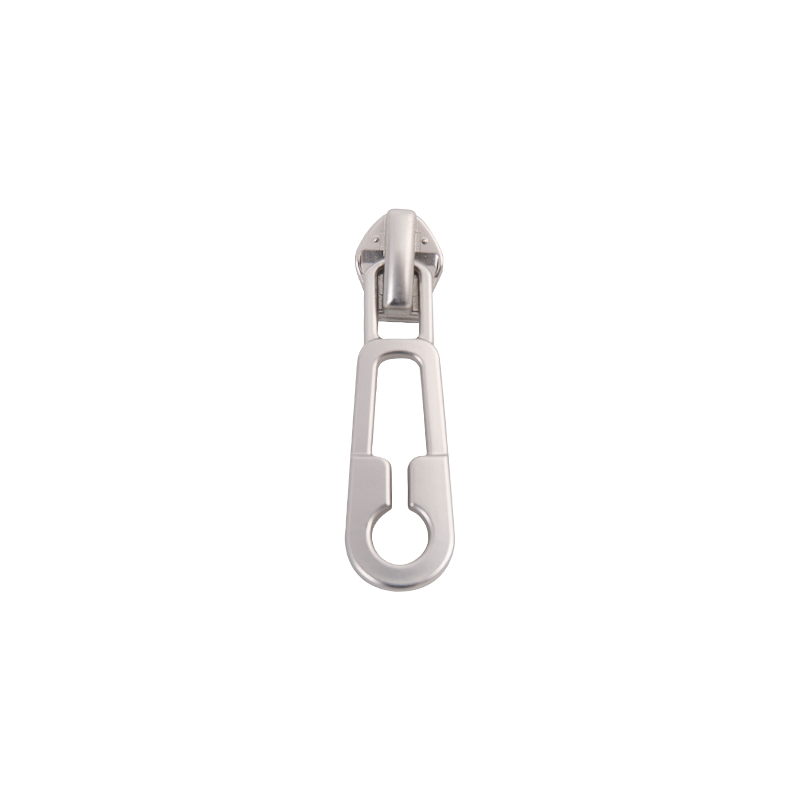The material selection of nylon zipper slider has a direct and significant impact on sliding performance and durability. As the core component of the zipper system, the material of the zipper slider not only affects the smoothness of sliding, but also determines the slider's service life, wear resistance and anti-aging ability. The following is the specific impact of different materials on the performance of nylon zipper sliders:
1. Sliding performance
Nylon material: Nylon itself has a certain sliding property, which is suitable for making sliders and can provide smooth opening and closing operations. The surface of nylon sliders is usually smooth, which can reduce friction and make the zipper slide smoothly. Under low load and low frequency use, nylon sliders have better sliding performance.
Lubricity: Nylon material can enhance sliding performance and reduce friction during sliding by adding lubricants (such as PTFE). Improved lubricity can further improve the smoothness of the slider's opening and closing and avoid jamming.
Surface smoothness: The surface flatness and smoothness of nylon affect the smoothness of sliding. During the production process, surface treatment such as heat treatment or coating can improve surface smoothness and further improve sliding performance.
2. Wear resistance and durability
Nylon wear resistance: Nylon has good wear resistance, but the surface of the nylon slider may wear under long-term and high-frequency use, especially when subjected to large loads or frequent friction. Wear will cause the contact between the slider and the zipper tape or chain to become unstable, thus affecting the overall smoothness of the zipper.
Reinforced nylon (such as glass fiber reinforced nylon): In order to improve the wear resistance of the slider, glass fiber reinforced nylon (GF-PA) can be used. This material has higher hardness, wear resistance and impact resistance than ordinary nylon, and can maintain better sliding performance in high-frequency use and extend service life. Glass fiber reinforced nylon is often used in demanding industrial and outdoor applications.
Other reinforced materials: In addition to glass fiber reinforced nylon, there are some composite materials that can be used to improve the wear resistance of the slider. For example, nylon materials with ceramic powder or carbon fiber added can significantly improve the wear resistance and corrosion resistance of the slider while improving strength and hardness.
3. Corrosion resistance
Chemical resistance: Nylon has relatively weak chemical resistance, especially when exposed to strong acid, strong alkali and other environments, nylon may be corroded, resulting in decreased slider performance. If the slider is exposed to an environment with more chemical media, such as chemical plants, marine climates, etc., it is recommended to choose corrosion-resistant materials (such as coated nylon or stainless steel sliders).
Surface treatment: Surface treatment (such as galvanizing, coating PTFE layer) can improve the corrosion resistance of nylon zipper sliders and increase their durability in harsh environments.
4. High temperature resistance
High temperature performance of ordinary nylon: Nylon's high temperature resistance is generally poor. In an environment exceeding about 120°C, ordinary nylon may soften, deform or age, affecting the performance of the zipper. If the slider is exposed to high temperature for a long time (such as high temperature work clothes or high temperature equipment), ordinary nylon may not be suitable.
High temperature nylon (such as PA66): To solve this problem, the use of high temperature resistant nylon materials (such as PA66) can improve the performance of the slider in high temperature environments. PA66 has better thermal stability and can maintain strength and shape stability at higher temperatures.
5. Anti-UV and anti-aging properties
The impact of UV on nylon: When nylon is exposed to UV for a long time (such as outdoor environment, sunlight, etc.), it is prone to UV aging, making it brittle, losing its gloss and causing performance degradation. Especially in high temperature and strong UV environment, nylon sliders may age quickly.
UV stabilizers and anti-aging additives: By adding anti-UV stabilizers or antioxidants to nylon materials, the damage of UV to the slider can be effectively delayed, and its weather resistance and service life can be improved. This is especially important for outdoor applications (such as tents, backpacks, outdoor clothing, etc.).
6. Balance between cost and performance
Cost considerations: As a common engineering plastic, nylon is relatively cheap and suitable for most common use scenarios. However, for products with high performance requirements, it may be necessary to choose more expensive reinforced nylon materials or special coating treatments, which will increase production costs.
Material selection trade-offs: When choosing a nylon zipper slider material, you need to consider sliding performance, wear resistance, high temperature resistance, corrosion resistance, and cost to make the best choice. For example, ordinary nylon is suitable for clothing, bags, etc. in daily life, while glass fiber reinforced nylon or high temperature resistant nylon is suitable for more demanding industrial or outdoor applications.
7. Environmental friendliness of nylon zipper slider
Environmentally friendly material selection: In markets with high environmental requirements, the use of nylon materials that meet environmental standards (such as halogen-free nylon, recyclable nylon) is also a consideration. Using materials that meet green manufacturing not only helps reduce environmental burdens, but also helps enhance brand image.
The material selection of nylon zipper sliders directly affects its sliding performance, wear resistance, corrosion resistance, high temperature resistance, and UV and aging resistance. Ordinary nylon is suitable for general use, but if higher wear resistance, high temperature resistance or UV resistance is required, glass fiber reinforced nylon, PA66 nylon or surface treatment (such as lubrication, coating) can be selected to improve the performance of the slider. For products that need to be used in harsh environments, it is very important to choose the right nylon material and optimize the design.

 en
en  русский
русский 한국어
한국어 get a free quote
get a free quote
















